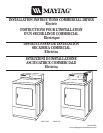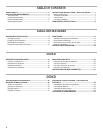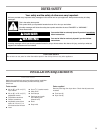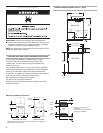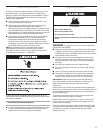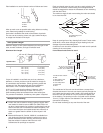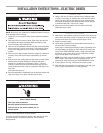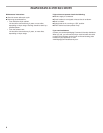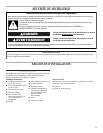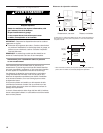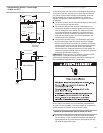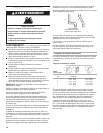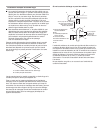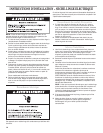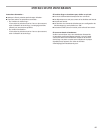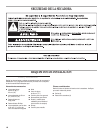
5
Electrical Requirements
This dryer is supplied without an electric cord and plug. It must
b
e connected by a competent electrician to a single-phase
electricity supply at the voltage shown on the dataplate, using a
suitable fixed wiring installation in accordance with local and
n
ational wiring regulations.
■
A 3-wire circular cord of minimum conductor size 2.5 mm
2
cross-section area should be used.
■ A 30A supply fuse should be used, and a switch having a
contact separation in both poles that provides full
d
isconnection under over-voltage category III conditions must
be incorporated into the fixed wiring in accordance with local
wiring regulations. The dryer should be positioned so that the
d
isconnection switch is easily accessible to the user.
■ A cord clamp bush is provided on the dryer, and should be
tightened on completion of wiring. The electrical mains
terminals are located behind the small rear access panel
(terminal block cover), and connections should be made in
accordance with the terminal markings. Remember to replace
the terminal access panel (terminal block cover).
NOTE: In accordance with the European EMC Directive
(2004/108/EC), the maximum electricity supply system
impedance to which the electric dryer should be connected
is declared to be 0.302 Ohm + j0.189 Ohm.
If codes permit and an additional earth bond wire is used, it is
recommended that a qualified electrician determine that the earth
bond path is adequate.
Recommended Earthing Method
■ It is your responsibility to contact a qualified electrical installer
to ensure that the electrical installation is adequate and in
conformance with all local codes and ordinances.
WARNING
Fire Hazard
Use a heavy metal vent.
D
o not use a plastic vent.
Do not use a metal foil vent.
Failure to follow these instructions can result in death
or fire.
Venting Requirements
WARNING: To reduce the risk of fire, this dryer MUST BE
EXHAUSTED OUTDOORS.
■ Adequate ventilation has to be provided to avoid the backflow
of gases into the room from appliances burning other fuels,
including open fires (i.e. available airflow into the room should
match airflow out from the room).
■ The dryer vent must not be discharged into a flue which is
used for exhausting fumes from appliances burning gas or
other fuels, chimney, wall, ceiling, or a concealed space of
a building.
■ Do not use an exhaust hood with a magnetic latch.
■ Do not install flexible metal vent in enclosed walls, ceilings,
or floors.
■ 102 mm (4") heavy metal vent and clamps must be used.
■ Use clamps to seal all joints. Vent must not be connected
or secured with screws or other fastening devices which
extend into the interior of the vent. Do not use duct tape.
IMPORTANT: Observe all governing codes and ordinances.
Use a heavy metal vent. Do not use plastic or metal foil vent.
Rigid metal vent is recommended to prevent crushing
and kinking.
Flexible metal vent must be fully extended and supported when
the dryer is in its final position. Remove excess flexible metal vent
to avoid sagging and kinking that may result in reduced airflow
and poor performance.
An exhaust hood should cap the vent to prevent rodents and
insects from entering the home or business.
Exhaust hood must be at least 30.5 cm (12") from the ground
or any object that may be in the path of the exhaust (such as
flowers, rocks, or bushes).
If using an existing vent system, clean lint from the entire length
of the system and make sure exhaust hood is not plugged with
lint. Replace any plastic or metal foil vent with rigid metal or
flexible metal vent.



